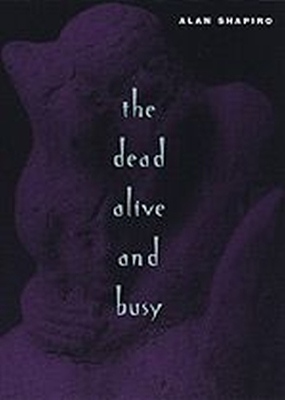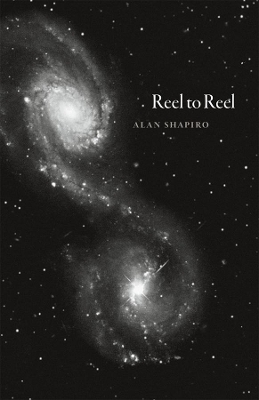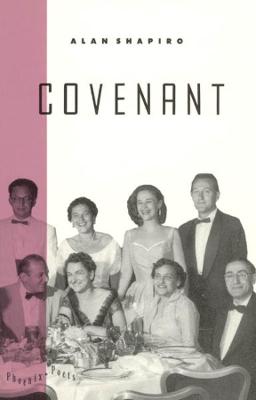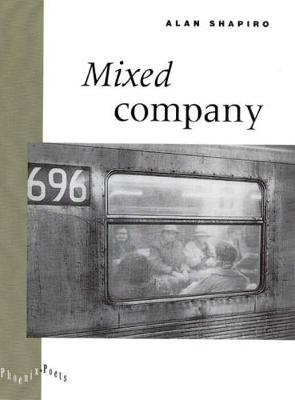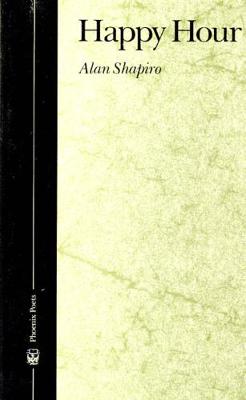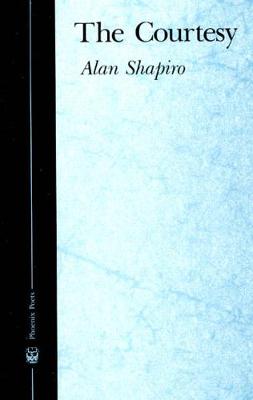Phoenix Poets Series PP (CHUP)
6 total works
In his sixth book of poems, Alan Shapiro once again shows that he is a master at articulating the secrets of the heart. "The Dead Alive and Busy" deals with issues of personal identity as revealed through examining the intimate bonds of family life. The poems explore these familial relations in terms of the religious, social and literary contexts that inform them, delving into such universal themes as human frailty, illness and death, bereavement and thwarted desires. By turns lyrical and narrative, slangy and elevated, analytical and visionary, this collection showcases one of America's most important poets in his top form.
Wherever My Dead Go When I'm Not Remembering Them. Not gone, not here, a fern trace in the stone of living tissue it can somehow flourish from; or the dried up channel and the absent current; or maybe it's like a subway passenger on a platform in a dim lit station late at night between trains, after the trains have stopped - ahead only the faintest rumbling of the last one disappearing, and behind the dark you're looking down for any hint of light-where is it? why won't it come? you wandering now along the yellow line, restless, not knowing who you are, or even where until you see it, there it is, approaching, and you hurry to the spot you don't know how you know is marked for you, and you alone, as the door slides open into your being once again my father, my sister or brother, as if nothing's changed, as if to be known were the destination. Where are we going? What are we doing here? you don't ask, you don't notice the blur of stations we're racing past, the others out there watching in the dim light, baffled, who for a moment thought the train was theirs.
Reel to Reel, Alan Shapiro's twelfth collection of poetry, moves outward from the intimate spaces of family and romantic life to embrace not only the human realm of politics and culture but also the natural world, and even the outer spaces of the cosmos itself. In language richly nuanced yet accessible, these poems inhabit and explore fundamental questions of existence, such as time, mortality, consciousness, and matter. Shapiro brings his humor, imaginative intensity, characteristic syntactical energy, and generous heart to bear on life's ultimate mysteries. In ways few poets have done, he writes from a premodern, primal sense of wonder about our postmodern world.
Reel to Reel, Alan Shapiro's twelfth collection of poetry, moves outward from the intimate spaces of family and romantic life to embrace not only the human realm of politics and culture but also the natural world, and even the outer spaces of the cosmos itself. In language richly nuanced yet accessible, these poems inhabit and explore fundamental questions of existence, such as time, mortality, consciousness, and matter. Shapiro brings his humor, imaginative intensity, characteristic syntactical energy, and generous heart to bear on life's ultimate mysteries. In ways few poets have done, he writes from a premodern, primal sense of wonder about our postmodern world.
"The coherence Shapiro prizes is both more thorough and more thoroughgoing than that offered by a moralizing intelligence. His poetry comes by its sad wisdom through its accomodations to human happenstance and estrangement. . . .In Covenant, sympathy grounds itself in worldly particulars, and subjectivity begets responsibilities. Hardnosed yet tenderly attentive, Shapiro's acute self-consciousness distills an exacting conscientiousness."—David Barber, Poetry
"At forty-years-old and already the author of four superbly written books of poems, Shapiro has produced a work of such authority and originality that he has permanently enlarged my hopes and expectations for contemporary poetry. His risk-loving swiftness of perception and his affinity for stories that up-end convention and taboo have enabled him to reclaim, for poets of my generation, areas of feeling and linguistic virtuosity that originated with William Carlos Williams, Elizabeth Bishop, J. V. Cunningham, and Ivor Winters. It is hard for me to see how an ideal anthologist of the future will be able to include their names without gratefully including his."—Tom Sleigh, Boston Phoenix
"At forty-years-old and already the author of four superbly written books of poems, Shapiro has produced a work of such authority and originality that he has permanently enlarged my hopes and expectations for contemporary poetry. His risk-loving swiftness of perception and his affinity for stories that up-end convention and taboo have enabled him to reclaim, for poets of my generation, areas of feeling and linguistic virtuosity that originated with William Carlos Williams, Elizabeth Bishop, J. V. Cunningham, and Ivor Winters. It is hard for me to see how an ideal anthologist of the future will be able to include their names without gratefully including his."—Tom Sleigh, Boston Phoenix
Respected poet, teacher, and critic Alan Shapiro continues his much-acclaimed explorations of childhood, family, and marriage in Mixed Company. Revealing a world troubled by difference while struggling toward commonality, and with equal attention to historical detail and the poetics of everyday life, from the mythic past to the abrasive intimacies of the present, Shapiro charts the many ways our social and sexual identities are formed, threatened, altered, and, for good or ill, preserved. Deeply felt and ambitious, Mixed Company is an extraordinary book by one of the leading poets writing in America today.
"What draws us into Alan Shapiro's Mixed Company is not a conspicuous felicity or any sort of bravura, but the quiet, undaunted way he goes after the truth of human feeling and motive. . . . The poems grope and conjecture, looking for understanding . . . but whatever may remain unsolved and insoluble, the poems are full of astonishing insights, a rare articulateness, and what another age called 'knowledge of the human heart.'" —Richard Wilbur
"What draws us into Alan Shapiro's Mixed Company is not a conspicuous felicity or any sort of bravura, but the quiet, undaunted way he goes after the truth of human feeling and motive. . . . The poems grope and conjecture, looking for understanding . . . but whatever may remain unsolved and insoluble, the poems are full of astonishing insights, a rare articulateness, and what another age called 'knowledge of the human heart.'" —Richard Wilbur
"Within his deliberately narrowed range Mr. Shapiro has cultivated a new generosity of detail and insight. This is especially important in the longer poems here, narratives of considerable power. They may seem more like versified short stories than poems, but their skill and force are moving."—J. D. McClatchy, New York Times Book Review
"Happy Hour is one of the best collections I have recently read. Mr. Shapiro writes with apparently equal ease in free verse and more nearly traditional forms, and he brings his formidable technical skills to bear upon matters of great urgency: our need to love and be loved, and the often perverse ways in which we maintain our connections to those closest to us."—Henry Taylor, Washington Times
"This is a haunting, mature collection that should attract a larger audience for Shapiro's fine poems."—Thomas Swiss, Chicago Tribune
"Happy Hour is one of the best collections I have recently read. Mr. Shapiro writes with apparently equal ease in free verse and more nearly traditional forms, and he brings his formidable technical skills to bear upon matters of great urgency: our need to love and be loved, and the often perverse ways in which we maintain our connections to those closest to us."—Henry Taylor, Washington Times
"This is a haunting, mature collection that should attract a larger audience for Shapiro's fine poems."—Thomas Swiss, Chicago Tribune
In this, his first book, Alan Shapiro vividly recreates some of the more memorable and poignant moments from his Jewish-American childhood, and in the process reveals his compassionate interest in the forgotten, the alienated, and the infirm. The Courtesy is an intelligent, reflective examination of the poet's own psychological history. "The Courtesy is really an admirable book: it shows up the unreality of a lot of the other poetry one reads, dealing honestly and with that perversity which is a sign of thoughfulness, with the slight but heavy matter of our everyday defeats."--Michael Hoffman, Poetry Nation Review
